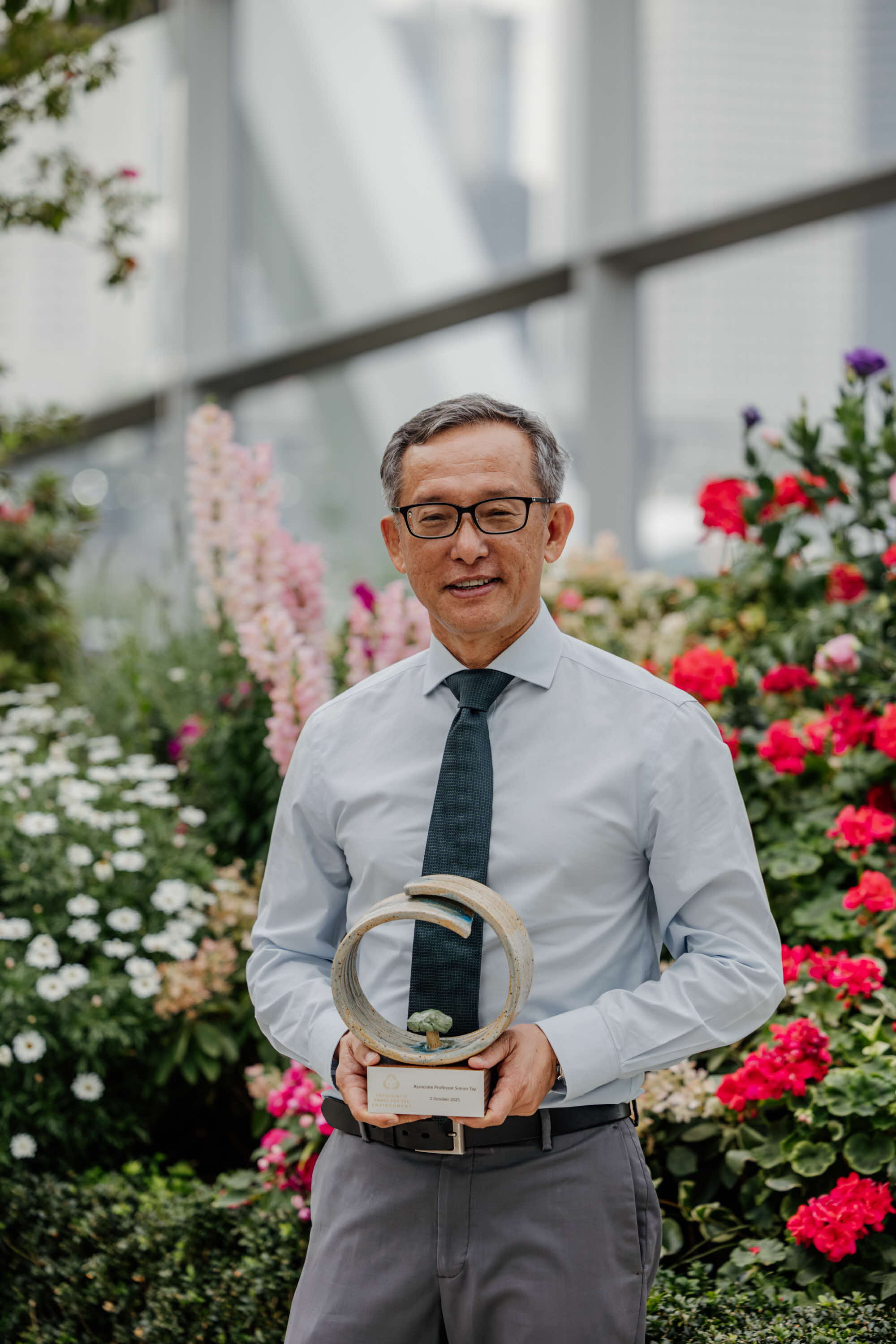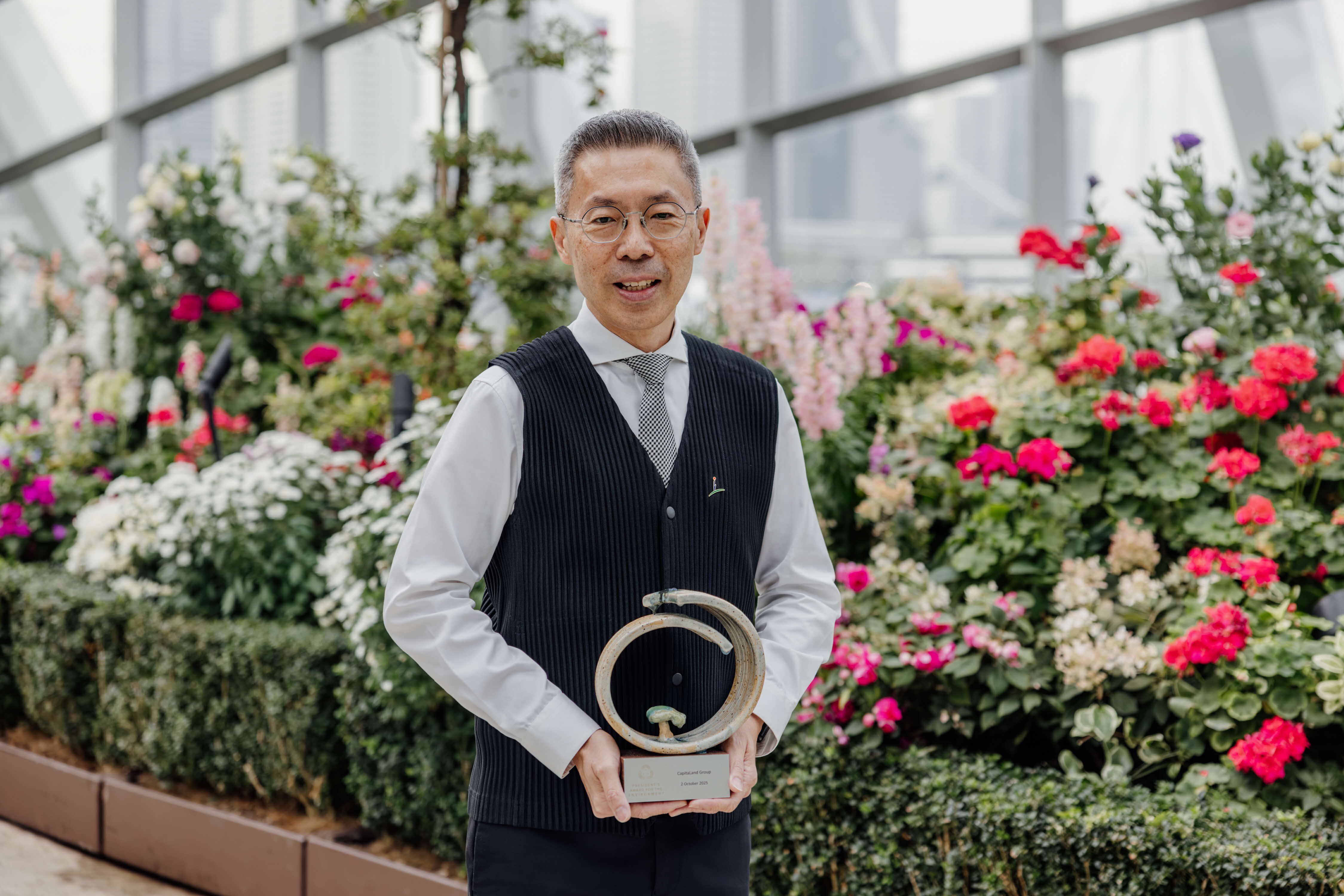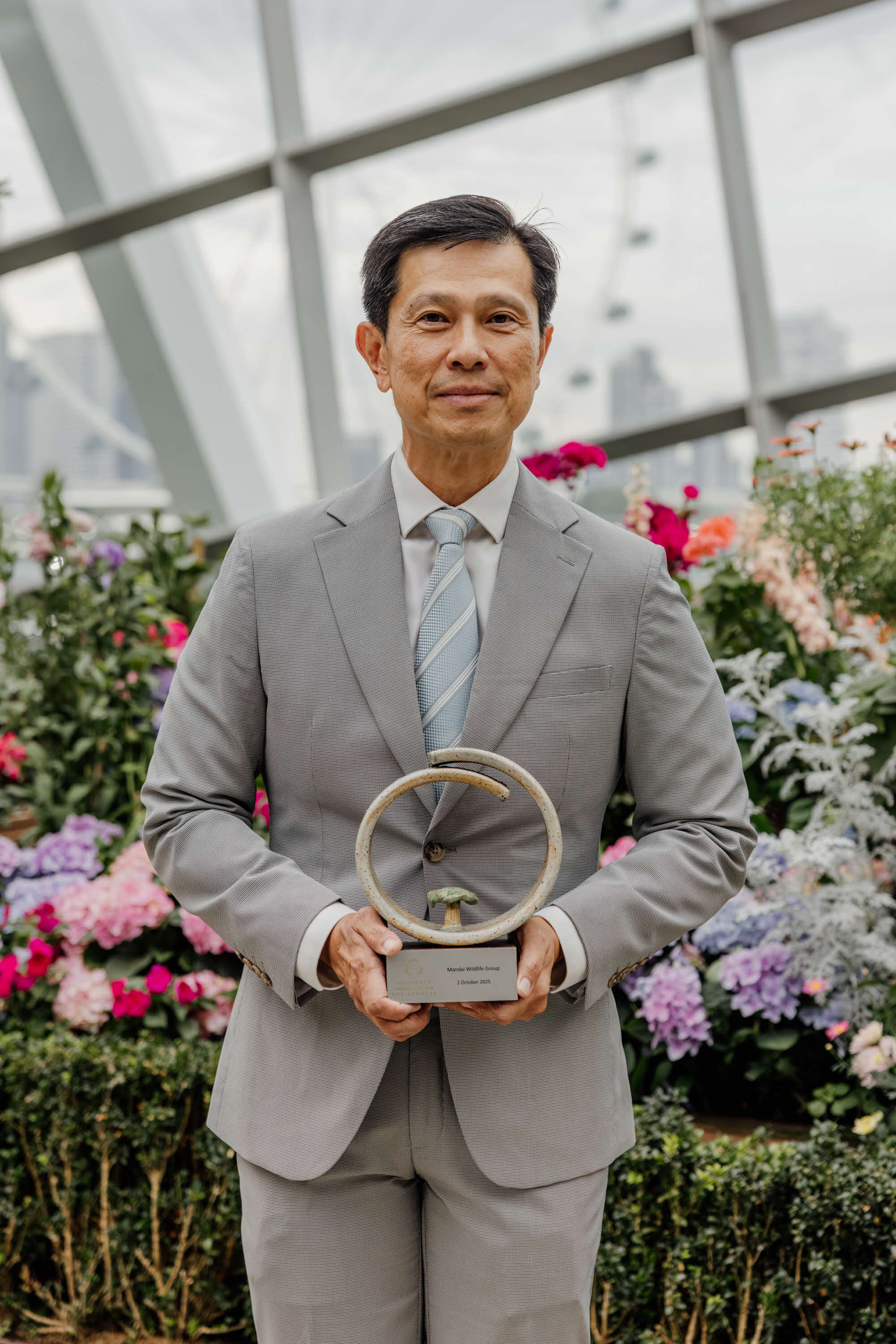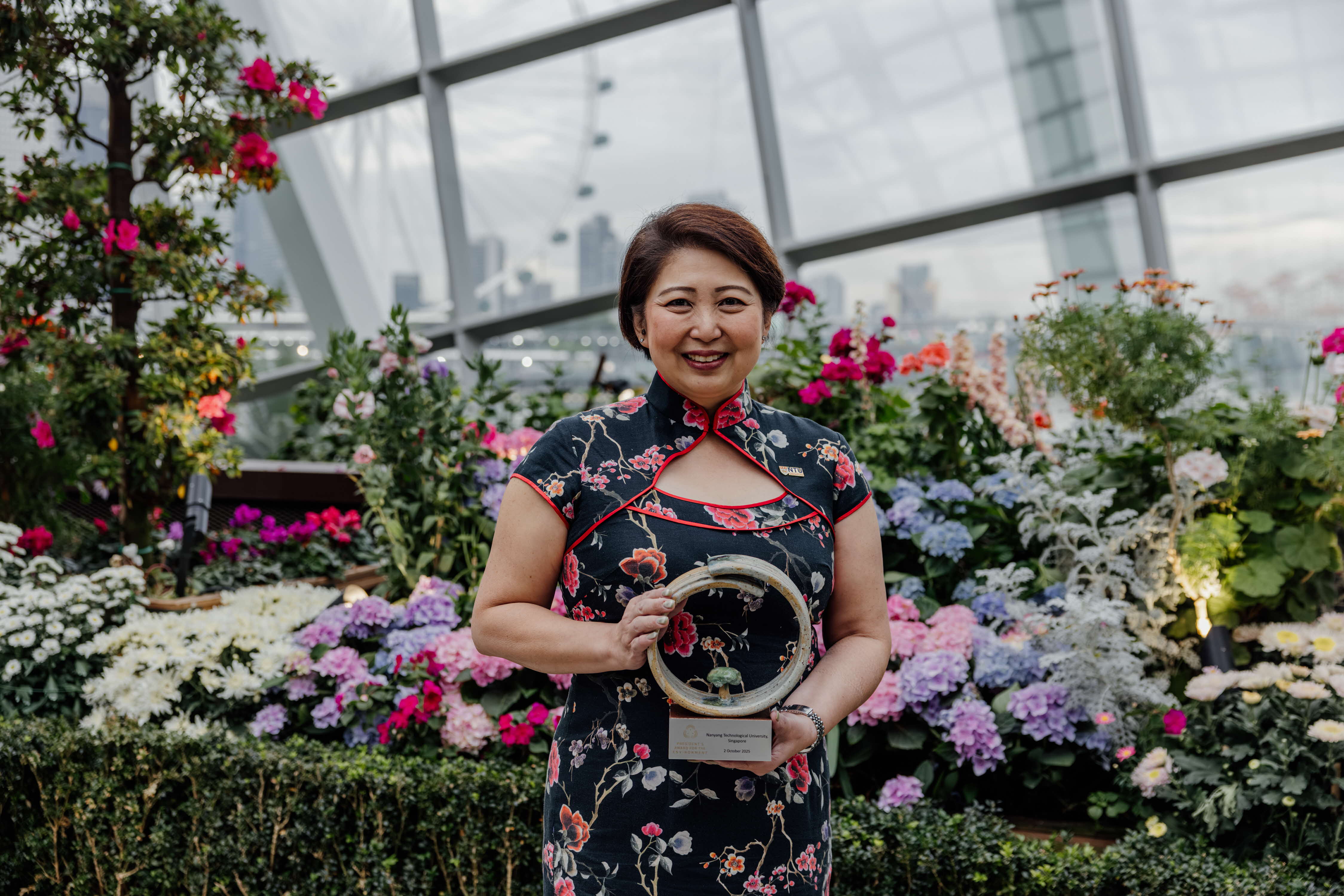2025 PAE Recipients
Learn more about their sustainability initiatives.

Associate Professor (A/P) Simon Tay has demonstrated sustained leadership in championing transboundary haze issues within the region for over 28 years.
He is highly regarded in the field, contributing to building knowledge on haze and other environmental issues as an academic, facilitating diplomatic exchanges with ASEAN stakeholders to address deforestation and emissions, and forging collaborations among 3P stakeholders locally and internationally. As a Nominated Member of Parliament, A/P Tay initiated the first parliamentary motion on transboundary haze in 1998. In 1997, A/P Tay convened and chaired the first international dialogue on transboundary haze pollution, and he continues to regularly engage governments, industries and non-governmental organisations on issues relating to deforestation and emissions from plantation industries.
As Chairman of the Singapore Institute of International Affairs (SIIA), A/P Tay has been leading the organisation to establish partnerships and develop initiatives to raise awareness and build capability on transboundary haze issues. This includes organising the annual Singapore Dialogue on Sustainable World Resources since 2014 and directing the Haze Outlook report since 2019. More recently, in 2024, he led SIIA to launch the ASEAN Think Tank Summit (ATTS), a Track II platform to feed insights and recommendations from think tanks to ASEAN member states, including on regional sustainability and haze issues. SIIA also strengthened industry collaboration to accelerate green transition through initiatives such the Collaborative Initiative for Green Finance in Singapore in 2017 which was supported by key financial sector stakeholders, as well as the Singapore Alliance for Sustainable Palm Oil in 2016, and Clean City Air Coalition in 2012.
A/P Tay advanced environmental sustainability, resource efficiency, and public health as NEA’s inaugural Chairman from 2002 to 2008. His notable contributions include advocating for reliable meteorological and air quality information, overseeing the implementation of programmes targeting mosquito-borne diseases, and encouraging 3P collaboration on environmental issues. He also co-chaired the Concept Plan 2001 and oversaw the development of the Singapore Green Plan 2012.
For his contributions, A/P Tay has been awarded the Public Service Medal (2006), Eisenhower Fellowship (2002), and World Economic Forum Global Leader of Tomorrow (2000).
.png)
Dr Leong Chee Chiew (posthumously conferred) was a pioneer and stalwart in shaping Singapore’s natural landscape and nurturing nature-centric communities. Dr Leong had dedicated more than 40 years of service to greening Singapore through various appointments in NParks, including as the former Commissioner of Parks and Recreation and Deputy Chief Executive Officer. He was instrumental in Singapore’s transformation from a Garden City to a City in Nature under our Singapore Green Plan 2030.
Dr Leong helped build up a community of nature stewards, where he was involved in the creation and growth of Singapore’s Nature Park Network, conceptualisation of the Nature Ways programme, and the development of conservation, community and youth programmes including the Forest Restoration Action Plan under the Nature Conservation Masterplan, Community-in-Bloom Programme, Youth Stewards for Nature Programme and Nature Kakis Network.
Dr Leong played a key role in strengthening the Singapore Botanic Gardens’ position as an icon of Singapore’s cultural and natural heritage. He was heavily involved in the re-development masterplan of the Botanic Gardens and inscription as a UNESCO World Heritage Site.
Dr Leong further spearheaded plans in capacity building within the landscape industry. He played a key role in establishing the Centre for Urban Greenery and Ecology, and contributed to the development of the Landscape Productivity Roadmap and formulation of the Progressive Wage Model for landscape workers. These culminated in the Landscape Sector Transformation Plan in 2019.
As Chairperson of the Ecological Profiling Exercise announced in 2021, Dr Leong worked closely alongside academics and nature community groups to map ecological profiles of green and blue spaces. The mappings were incorporated into Singapore’s urban planning strategies under the Long-Term Plan Review.
Beyond NParks, Dr Leong was Chairman of the Workplace Safety and Health Council (Landscape) Sub-committee (2008 to 2023) and member on the Urban Redevelopment Authority’s Orchard Road Development Commission (2005 to 2015). He also advised the Ministry of Transport and Land Transport Authority on the development of the Cross Island Line (2015 to 2022).
Dr Leong served in various other capacities, including 22 years on the Singapore Environment Council (SEC) Board of Directors (2001 to 2023). Dr Leong’s extensive knowledge in biodiversity conservation and community outreach significantly enhanced SEC’s ability to nurture and mentor environmental stewards among youths and the public. Notably, he provided biodiversity expertise in the development of SEC’s experiential nature treks, which enriched public appreciation of Singapore’s natural heritage. He also served on SEC’s Strategic Marketing and Fund-Raising Board Committee, guiding the management team on key programmes including its School Green Awards.
Beyond Singapore, Dr Leong was responsible for creating a regulatory framework and guidance for forestry through SEC’s green labelling for pulp and paper in 2015. This guidance has helped forest conservation management in Indonesia and Malaysia.
For his contributions, Dr Leong received the Public Administration Medal (Silver) (Bar) (2015) and Long Service Medal (2006).

CapitaLand Group (CLG) has demonstrated a strong commitment to sustainability stewardship. CLG’s sustainability journey is anchored in a robust governance framework and a unified strategy that brings together CapitaLand Investment (CLI) and CapitaLand Development (CLD) under One CapitaLand. This integrated approach ensures that sustainability is embedded across the entire fund management and real estate lifecycle. This is operationalised through the CLD Sustainability Framework, which drives the adoption of sustainable design in development projects, as well as the CLI 2030 Sustainability Master Plan, which builds portfolio and resource efficiency, enables thriving and future-adaptive communities and stewards responsible business conduct and governance.
In pursuit of carbon neutrality, CLG has displayed a strong ambition to reduce emissions throughout its value chain. A decarbonisation road map guides its efforts to achieve Net Zero carbon emissions for Scope 1 and 2 by 2050. To reduce emissions for Scope 3 activities, CLG collaborates with key stakeholders to adopt innovative design approaches, incorporate low-carbon building materials, and implement efficient construction and operation practices. EV charging stations and rooftop solar panels are progressively integrated across CapitaLand properties.
On the innovation front, CLG has contributed significantly towards fostering green innovation and building a sustainable ecosystem through four editions of its global CapitaLand Sustainability X Challenge (CSXC), which received entries from over 90 regions and selected projects piloted across its properties worldwide, as well as its Smart Urban Co-Innovation Lab – a platform for smart city solutions development.
CLG also partnered with Eco-Business for its inaugural Sustainability Summit, which convened key industry stakeholders to discuss decarbonisation solutions for the built environment and how climate finance can be mobilised to reduce urban emissions. Locally, CLD will be repurposing the industrial site at Kallang Way, with plans to include a food facility, contributing to Singapore’s advancement as a global food innovation hub.
Beyond its business operations, CLG has raised public awareness of environmental sustainability. For example, CLI’s two-year partnership with the SG Eco Fund has resulted in jointly curated environmental events and engagement activities, advancing sustainability awareness and impact across Singapore. Key initiatives include a Go Green Hub design project with Temasek Polytechnic’s School of Design and a public showcase of ground-up sustainability solutions and initiatives.
CLG’s sustainability efforts have been recognised in recent years, including the Green Mark 20th Anniversary Commemorative Certificate (2025), Dow Jones Sustainability World Index and Asia-Pacific Index (2024), GRESB (2024), and the Building and Construction Authority’s (BCA) Green Mark Platinum Champion Award (2020).

Mandai Wildlife Group (MWG) demonstrates a strong commitment to sustainability through its Environmental Sustainability Strategy which focuses on three strategic pillars: Sustainable Operations, Biodiversity Protection, and Sustainability Advocacy. MWG aims to achieve Net Zero carbon emissions by 2050.
MWG’s commitment to biodiversity protection is reflected in key initiatives like the Mandai Wildlife Bridge to facilitate safe crossings for native fauna and the Mandai Ecological Restoration Plan which is behind ongoing efforts to restore close to 3 hectares of degraded land by 2030. This has been achieved across more than 1.5 hectares of land to date. The Mandai Boardwalk adds to the luxuriant landscape of the precinct, while offering free access for the public to enjoy the panoramic views of the Upper Seletar Reservoir.
MWG provides funding and in-kind support to its conservation arm, Mandai Nature, which supports over 40 projects across Southeast Asia. Mandai Nature collaborates with field partners who implement initiatives to protect habitats and safeguard threatened species such as the critically endangered Negros bleeding-heart, Rote snake-necked turtle, and endangered silvery gibbon.
MWG champions sustainable practices and one of its key initiatives was the removal of all single-use fossil-based plastic such as carrier bags and bottled drinks from its operations to reduce plastic use in its parks. Instead, guests are encouraged to use the on-site water dispensers to refill their bottles. MWG has also been a founding member of the National Sustainable Procurement Roundtable (NSPR) since 2019. One key outcome of NSPR is the launch of “A Supplier’s Guide to Sustainability”, which MWG co-authored, to help suppliers make the transition in adopting sustainable procurement. MWG introduced its Green Procurement Policy in 2019 to drive sustainable sourcing across its operations. This has included the exclusive use of Certified Sustainable Palm Oil for cooking oil and 100% sustainably sourced seafood in its eateries. In 2025, MWG also achieved the highest tier in the Singapore Food Agency’s Farm-to-Table Recognition Programme (FTTRP).
MWG’s outreach and education efforts continue to impact the community and industry. In 2024, the Group engaged more than 300,000 visitors with sustainability content which was integrated into its park experiences at the Mandai Wildlife Reserve. MWG also collaborates with Institutes of Higher Learning and schools to foster the next generation of conservationists in the fields of biodiversity research, sustainability strategies and curriculum design. On the industry front, MWG co-developed the Green Excellence Programme with the Singapore Manufacturing Federation to equip SMEs with tools to embark on their sustainability journeys.
MWG has received several distinguished awards for its sustainability efforts, such as the World Association of Zoos and Aquariums Environmental Sustainability Award (2024), Singapore Tourism Board’s Outstanding Achievement in Sustainability Award (2023), and the BCA Green Mark Super Low Energy accreditation for Mandai Rainforest Resort, the first hotel in Singapore to achieve this accreditation.

Nanyang Technological University, Singapore (NTU) formalised its long-term sustainability commitments through a 15-year Sustainability Manifesto launched in 2021, and made history as the world’s first university to issue Sustainability-Linked Bonds. To steer strategies and coordinate efforts, NTU established a Campus Sustainability Steering Committee and a dedicated Sustainability Office.
On its 200-hectare campus, NTU generates about 10 million kWh of electricity annually from solar panels and has introduced a range of energy-efficient solutions. These include a fully electric shuttle bus fleet and the use of Passive Displacement Ventilation systems to reduce energy demand for cooling. NTU has also significantly greened its built environment, with all eligible buildings attaining Green Mark Platinum certification, eight achieving the Platinum Zero Energy rating, and one recognised as Platinum Positive Energy. For these efforts, NTU received the BCA Green Mark 20th Anniversary Commemorative Certificate in 2025.
NTU is equally committed to community engagement and education. Its annual Green for Good festival involves nature walks, workshops and exhibitions. In 2024, the festival attracted more than 10,000 participants and over 70 partners. Since 2021, sustainability has been integrated into NTU’s undergraduate curriculum through a compulsory core module, Sustainability: Society, Economy and Environment, which equips students with interdisciplinary skills to address real-world problems. NTU also offers sustainability-related graduate programmes, as well as Continuing Education and Training courses on green skills for working professionals.
The University places emphasis on safeguarding its natural environment. Home to a diverse range of wildlife, NTU has published a Wildlife Etiquette Handbook in collaboration with partners to guide the community on responsible interactions with wildlife on campus.
In research and innovation, NTU drives sustainability solutions through partnerships with government, industry and other research institutes. Its research spans key areas such as climate resilience, food security, the circular economy, and energy and resource efficiency.
NTU’s achievements have been recognised both locally and internationally. Recent accolades include the Prix Versailles Grand Prize for the World’s Most Beautiful Campus (2024), the Singapore Environmental Achievement Award (2024), the EuroCham Sustainability Award (2023), and the Singapore Business Review Technology Excellence Award (2023).
